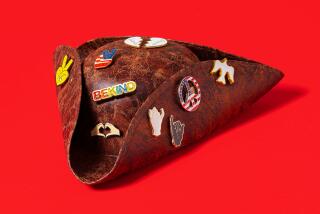Ours Is a Rude Age, but Have a Nice Day
- Share via
Manners have always had their thoughtful admirers, along with their merely numerous ones. After all, manners--good ones--help grease life’s highways. Parents teaching their children manners was once considered tantamount to putting shoes on their feet.
But given 30-odd years worth of toxicologically reduced decorum--what civility experts term the post-Woodstock decline--is it any wonder parents are feeling a little lonely, a little edgy?
What is a parent’s plea for “thank you” and “sir” and “ma’am” and “please” amid Internet raunch and mayhem, guns at school and on freeways, tantrum-throwing and spitting sports figures, the drones of trashy misfits exploited on daytime talk shows, TV shows like “Crossfire,” where politicos yell at one another in lieu of civilized discourse?
Worse yet, bad manners are now being culturally held up as big business--via the Howard Sterns and Dennis Rodmans of the world. Don’t just have bad manners, goes the line, have atrocious manners and watch what happens. You’ll get noticed, and maybe even rich and famous.
*
A 1996 U.S. News & World Report survey shows just how worried people are by all of this. Conducted in association with Bozell Worldwide, the survey showed that the vast majority of Americans feel we’ve reached a rude-mannered watershed.
Nine of 10 think incivility is a serious problem, and nearly half think it’s extremely serious. Seventy-eight percent believe the level of rudeness in society probably has worsened dramatically in the last 10 years and more than 90% think it contributes directly to the increase in today’s violence. Eighty-five percent think rudeness is puncturing the social fabric of the country.
Top on this list of punctures is the 1960s-born “cult of the self,” says Pier Massimo Forni, a Johns Hopkins University professor who has studied the decline of civility in America and other countries for several years, and who will host a university-sponsored conference on the subject next spring.
In the past, Forni says, “children had never heard of the aggrandizement of the self over decorum. Children were never taught they were No. 1, and that their feelings, thoughts, desires were equal or more important than anything or anyone else.”
That lesson is in direct contrast to the root of manners, he says: that you can transcend the self and be more aware of others. And thus the massive boombox blaring two inches from a stranger’s head; you got a problem with that?
He says because many Americans fear we’ve become a “nation of strangers,” manners have taken a plunge.
Explains Forni: “When people feel anonymous, their behavior tends to reflect less restraint. Why not be verbally abusive on the road? Who will ever know? Strangers have no reputations, and fewer guilts.” He says the anonymity also shows up in American over-friendliness, such as the gushing “have a nice day,” intimate chit-chat with waiters and business routinely conducted on a first-name basis. “Two sides to the same coin,” he says.
A loosely formed civility and manners movement is building. The U.S. government is getting into the act, sponsoring new study commissions and offering podiums for groups like former Georgia Sen. Sam Nunn and former Education Secretary William Bennett’s National Commission on Civic Renewal, launched in January.
*
Patricia Schroeder heads a “New Century/New Solution” project sponsored by the Boston-based Institute for Civil Society, begun last year from an anonymous grant of $35 million. The institute’s goals? To recenter the concept that civility, manners and well-bred social intercourse are safeguards for a democratic society.
“People are concerned about a culture that’s getting more vulgar and out of control,” says Pam Solo, director of the institute.
However, not everyone is comfortable with a manners crusade, Some see it as elitist or intolerant. Traditionally, manners have been used to distinguish the well-bred from the lower classes and, in a multicultural, pluralistic, democratic society, there’s danger in labeling one behavior better than another, or so the argument goes.
“It’s less about societal snobbishness than it is about what society will tolerate and what the parameters are for behavior,” counters Arlene Isaacs, a New York-based consultant to corporations in manners awareness.
“The sooner kids know life isn’t a free-for-all, and that the way you are perceived is the way you will be received, the better,” Isaacs says. “The question I use is this: Do you want to be invited to the party--and more importantly, do you want to be invited back? Then you better watch your manners.”
Her sentiments are echoed by writer James Morris in the Wilson Quarterly, who claims we are “in the Age of Whatever.” He says that society needs to make some judgments about tolerable and even preferable behavior. He says even the trend toward casual and sloppy attire cries out to be rethought. “People appear in public in clothes that must scare the hangers in a dark closet,” he says.
“We’ve had a legacy of the ‘60s that manners are bad because they’re artificial, and we should behave naturally,” says Judith Martin, better known as Miss Manners for her syndicated newspaper column.
“We’ve seen where that’s gotten us.”
More to Read
Sign up for Essential California
The most important California stories and recommendations in your inbox every morning.
You may occasionally receive promotional content from the Los Angeles Times.













